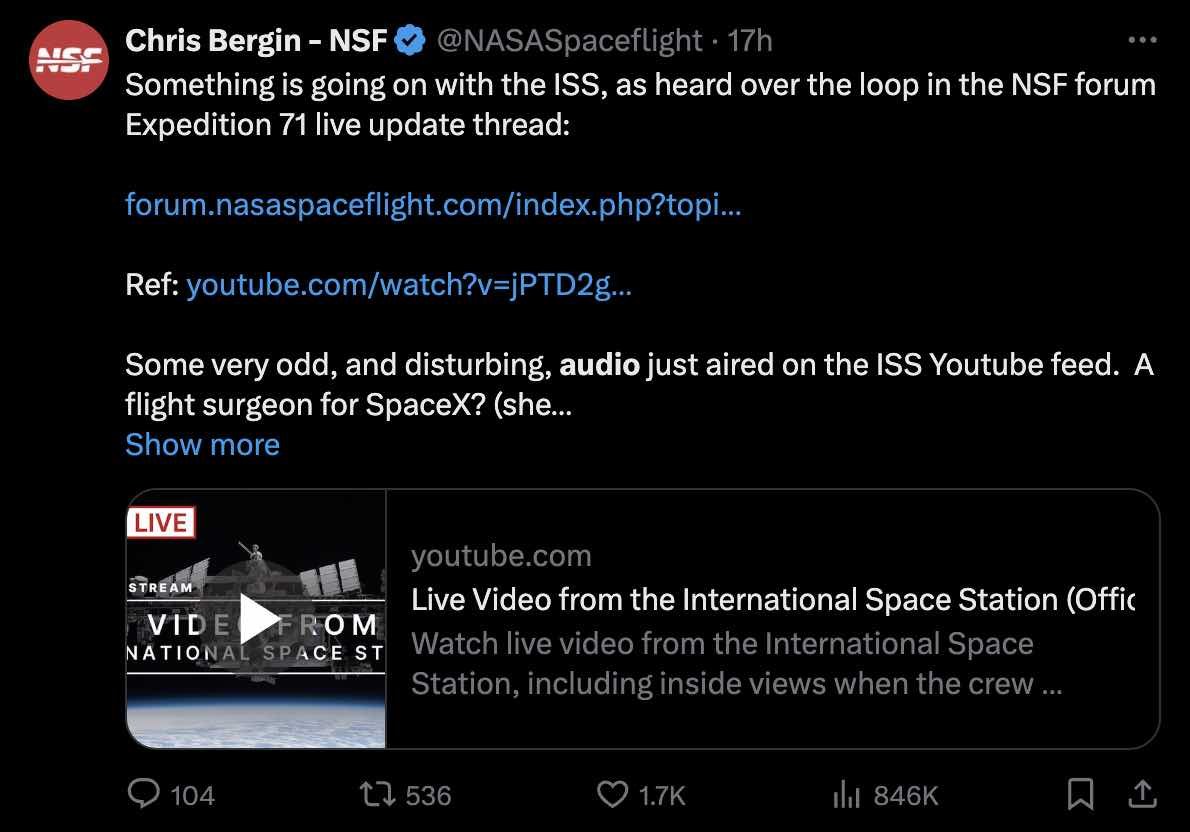

Welcome to this week’s Intelligence Brief… yesterday, an alarming situation unfolded as live listeners were made privy to a NASA audio feed that appeared to convey an emergency situation unfolding in space. We’ll be taking a look at 1) what went live in an audio feed routed to NASA’s YouTube channel yesterday that caused concerns among listeners, 2) what a NASA technical brief says about the medical condition that was discussed during the broadcast, and finally 3) what NASA officially had to say about the incident in a statement later posted on social media.
Quote of the Week
“Houston, we’ve had a problem here.”
– Apollo 13 Astronaut John Swigert
Latest News: In recent articles at The Debrief, DARPA is aiming to revolutionize global military surveillance and underwater communication using neutrino detection technology, and recent experiments funded by the U.S. Department of Energy show the uncanny ability to squeeze infrared light by 90%. All of our recent stories can be found at the end of this week’s newsletter.
Podcasts: In podcasts this week, on The Debrief Weekly Report, MJ and Kenna discuss the successful 3D printing of metal material on the ISS, the first-ever Master’s Degree in Psychedelics, and a new metal coating that changes regular glasses into night-vision goggles. Over on The Micah Hanks Program, I take a look at the current efforts of NASA, AARO, and civilian scientist groups in their pursuit of the unexplained. You can subscribe to all The Debrief’s podcasts on our Podcasts Page.
Video News: Premiering this week on Rebelliously Curious, Chrissy Newton is joined by John Priestland and Dr. Daniel Stubbings of the UK-based uNHIdden initiative. Be sure to check out other great content from The Debrief on our official YouTube Channel.
Now, it’s time to shift our focus to the incident that unfolded this week and led to concerns about a possible medical emergency on board the International Space Station.
An Emergency Aboard the ISS?
A concerning situation unfolded on Wednesday as a live feed broadcast on NASA’s official YouTube channel appeared to convey an emergency unfolding aboard the International Space Station (ISS).
During the live stream, listeners were able to hear a woman’s voice as she provided what appeared to be guidance on treating an astronaut suffering from decompression sickness.
“So if we could get uh, uh, commander back in his suit, um, get it sealed and fall—step into procedure 5.180 for suited hyperbaric treatment, section three for oxygen post-splashdown, that would be my recommendation,” the woman was heard saying during Wednesday’s feed.
“Understand that this is a best-effort treatment,” the woman continued after several seconds of silence. “And so whatever you can do is going to be better than doing nothing.” The speaker then requested that before closing the visor and pressurizing the suit that the commander’s pulse be checked one more time.
The unnerving audio feed (which can be heard here) prompted several concerned listeners to take to social media, including Chris Bergin, managing editor for NASA Space Flight, who noted that “Some very odd, and disturbing, audio just aired on the ISS Youtube feed.”


Decompression Sickness
According to a NASA technical brief, decompression sickness (DCS) poses a significant concern for spaceflight and certain terrestrial settings. It occurs when nitrogen bubbles or other gases in the bloodstream (known as emboli) cause tissue damage.
While venous gas emboli (VGE) are typically filtered out by the lungs, arterial gas emboli (AGE) can severely compromise tissue oxygenation, leading to far more serious effects. When an astronaut enters a hypobaric environment, the excess inert gas that cannot be held in solution may form gas spaces, potentially displacing or damaging tissues. To mitigate DCS, pre-breathe protocols involving body denitrogenation with oxygen are employed.
Of the two types of DCS, Type I is characterized by joint pain, tingling or numbness in a single extremity, and mild skin symptoms. Type II DCS involves central nervous system or cardiovascular symptoms, which can potentially lead to death. Symptoms of Type II DCS include muscle weakness, confusion, impaired balance, and stroke.
A False Alarm
Fortunately, the drama that unfolded on Wednesday was a false alarm, as NASA later confirmed in an official statement.
“There is no emergency situation going on aboard the International Space Station,” read the statement issued from the official X account of the International Space Station.


“At approximately 5:28 p.m. CDT, audio was aired on the NASA livestream from a simulation audio channel on the ground indicating a crew member was experiencing effects related to decompression sickness (DCS),” the statement read. “This audio was inadvertently misrouted from an ongoing simulation where crew members and ground teams train for various scenarios in space and is not related to a real emergency.”
Obviously, the simulation that was mistakenly broadcast live on NASA’s YouTube channel seemed realistic enough that it had quite a few live listeners concerned. Fortunately, that realism was only intended to offer a realistic training environment to aid in planning and preparedness if such an emergency should ever occur in the future.
“The International Space Station crew members were in their sleep period at the time,” NASA’s statement concluded. “All remain healthy and safe, and tomorrow’s spacewalk will start at 8 a.m. EDT as planned.”
That concludes this week’s installment of The Intelligence Brief. You can read past editions of The Intelligence Brief at our website, or if you found this installment online, don’t forget to subscribe and get future email editions from us here. Also, if you have a tip or other information you’d like to send along directly to me, you can email me at micah [@] thedebrief [dot] org, or Tweet at me @MicahHanks.


Here are the top stories we’re covering right now…
- DARPA’s Secretive New Neutrino Detector Program Could Be A Game-Changer for Global Underwater Military Surveillance
DARPA is aiming to revolutionize global military surveillance and underwater communication using neutrino detection technology.
- DOE-Funded Experiments that ‘Squeeze’ Infrared Light by 90% Establish a Whole New Class of Optical Materials
Experiments funded by the U.S. Department of Energy show the uncanny ability to squeeze infrared light by 90%.
- That Washing Machine is a 3D Printer This week on The Debrief Weekly Report…
In this week’s episode of the DWR, MJ and Kenna discuss the successful 3D printing of metal material on the ISS. The dynamic duo also dives into the first-ever Master’s Degree in Psychedelics offered at the University of Ottawa and a new metal coating that changes regular glasses into night-vision goggles.
- Astrobiologist Makes ‘Improbable’ Find atop Massive Martian Volcanoes
An international research team led by a Brown astrobiologist says they’ve discovered something ‘improbable’ atop these Martian volcanoes.
- Don’t Expect Aliens Anytime Soon: NASA Scientists Discuss The Challenges James Webb Faces In the Hunt For ET
Insights from NASA scientists reveal why even with James Webb the quest to find alien life remains challenging and elusive.
- Clash Between General Relativity and Quantum Mechanics Could Be Resolved by New Mathematical Framework
New research is offering fresh insights into the long-held divide between general relativity and quantum mechanics.
- Scientists Develop Breakthrough “Living Bioelectronics” to Heal Skin and Revolutionize Medical Treatment
Scientists develop “living bioelectronics” combining cells and electronics, potentially revolutionizing medical diagnostics and treatments.
- Large Lake of Liquid Water underneath Mars’ Polar Ice Caps May Just be a Mirage
New research says the previous discovery of large lakes of liquid water underneath mars’ polar ice caps may just be an optical illusion.
- Artificial “Phantom Sensations” Without Physical Contact Could Lead to Immersive Virtual Reality
Researchers show how to create phantom sensations, or the feeling of being touched someplace on the body where there is no physical contact
- Aviation Safety and Unidentified Anomalous Phenomena Discussed at the European Parliament
Aviation safety and other potential concerns arising from UAP were discussed during a recent conference at the European Parliament.
- Gravity Without Mass? New Study Challenges the Existence of Hypothetical Dark Matter
A recent study that presents new challenges to the existence of dark matter suggests gravity may be able to exist even in the absence of mass.
- Japan Launches UAP Investigation Following U.S. Report Identifying Region as “Hotspot” for Sightings
Japanese lawmakers are launching an investigation into UAP incidents, citing concerns over possible foreign surveillance efforts.
- Optical Engineers Invent Ultra-Thin Coating That Turns Ordinary Glasses into High-Efficiency Night Vision Goggles
Cutting-edge night vision coating is thinner than plastic wrap and can turn ordinary glasses into high-efficiency night vision goggles.
- Boeing’s Starliner Makes History With Successful First Crewed Launch
Welcome to this week’s Intelligence Brief… this week, Boeing made history with the launch of its first crewed Starliner flight, a significant final flight test for the eagerly anticipated—and long-delayed—spacecraft. In our analysis, we’ll be looking at 1) the historic launch of Boeing’s partially reusable Starliner spacecraft, 2) what astronauts will be testing now that they’ve reached the ISS, 3) setbacks that have hindered Starliner’s launch, and 4) why this week’s launch represents a new milestone for NASA’s ongoing efforts […]
- NASA, AARO, and Scientists Pursuing the Unexplained
This week, we dive into recent discussions with military and intelligence professionals that underscore the seriousness of the UAP issue, highlighting skepticism towards AARO’s efforts and the need for a more collaborative approach to uncover the truth behind these mysterious encounters.
- Mysterious Newly Discovered “Phoenix” Exoplanet with Atmosphere Near Star Forcing Scientists to Rethink Planetary Evolution
“Phoenix,” a mysterious exoplanet retains its atmosphere despite harsh radiation from host star, challenging theories on planetary evolution
- First-Of-Its-Kind Master’s Degree in Psychedelics and Consciousness Will Analyze Link Between Science and Spirituality
The University of Ottawa is offering a first-of-its-kind Master’s degree program studying the medical and spiritual aspects of psychedelics. as well as their links to human consciousness.
